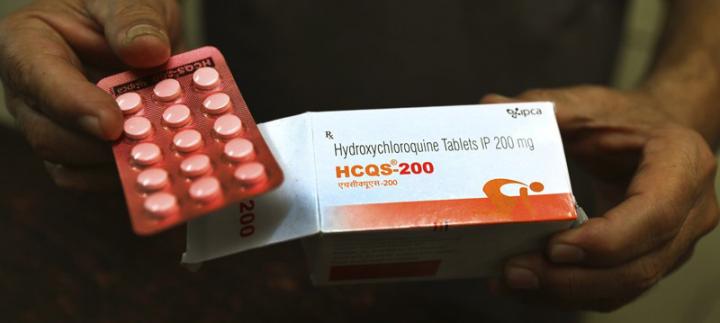Pharmacy experts at the University of Huddersfield are urging caution over claims that widely-available antimalarial drugs could be a “magic bullet” to prevent and cure CoVid-19. And the medicines can – if used rashly – have serious side effects.
Although there have been some encouraging signs from small-scale preliminary trials of the drugs chloroquine (CQ) and hydroxychloroquine (HCQ) when administered to coronavirus patients, the results are preliminary and should be treated with care, argue Dr Syed Shahzad Hasan and Dr Hamid Merchant.
They are co-authors – in collaboration with a pharmacist from Malaysia, Chia Siang Kow, of the International Medical University in Kuala Lumpur – of a new article in the British Journal of Pharmacy. It is freely available for all to read online.
The authors chart the excitement in press and social media over claims that CQ and HCQ could be effective COVID-19 treatments. But they also report how this had led to hoarding and therefore shortages of the drugs – available over the counter in some countries.
There have been reports of deaths in some parts of the world because of inappropriate self-use of CQ. And while the drugs have a good safety record, they can have seriously adverse side-effects, including loss of vision and fatal cardiovascular problems.
“It is the duty of pharmacists and other healthcare professionals to monitor the proper usage of these antimalarial drugs,” states the British Journal of Pharmacy article.
As the evidence currently stands, write the authors, CQ/HCQ cannot be used as a general treatment for all CoViD-19 patients.
“Its use should be restricted for the treatment of CoViD-19-associated pneumonia in severely-ill patients only under a trial or clinical supervision of a licenced practitioner and close cardiac monitoring.”
The article – titled Is it worth the wait? Should Chloroquine or Hydroxychloroquine be allowed for immediate use in Covid-19? – includes a bullet point list of key points and recommendations.
It is stated that “there is no evidence to support the mass use of CQ/HCQ to prevent the infection in public at large, therefore these drugs cannot be recommended for general use by the public to protect from acquiring SARS-CoV-2 infection. Social isolation and quarantine measures are still appropriate to control the infection until a reliable preventive option becomes available, for instance a vaccine”.
The authors also point out that there had been only limited use of CQ/HCQ in clinical settings and no conclusive, randomly-controlled trials are yet available.
It is argued that “there is a need for an open-access central repository where clinicians can record the use/outcomes of CQ/HCQ or other pharmacological interventions for the thorough scrutiny of the data by the global scientific community”.
The warnings sounded in the British Journal of Pharmacy article have since been reinforced by the U.S. Food and Drug Administration in a webpage that cautions against use of hydroxychloroquine or chloroquine for COVID-19 outside of the hospital setting or a clinical trial due to risk of heart rhythm problems.
Meanwhile, Dr Merchant, who is the Subject Leader at the University of Huddersfield’s Department of Pharmacy, and Dr Hasan, who is a Senior Research Fellow, continue to research and write about the latest developments in the coronavirus pandemic.
Analysis of potential treatments for COVID-19
Another article by Dr Merchant published in the British Medical Journal analyses a World Health Organisation trial of four potential treatments for COVID-19.
The article – also freely available online – is an 11-point analysis of the project. Dr Merchant acknowledges that “the launch of WHO’s Solidarity Trial came as good news for many, the public in general and clinicians in particular who are at the frontline to manage these crises”.
But he provides a detailed critique of the drugs that are and are not included in the WHO trial.
And he concludes that: “There are as many as seven variants of human coronavirus that have been reported and there have been reports of SARS-CoV-2 being further genetically evolving during the current COVID-19 outbreak. If the global Solidarity Trial will not offer all drug options/combinations across the world in a single co-ordinated trial, we fear that the data from different countries may not be directly comparable to draw any meaningful comparison”.


